PETER on Twitter tells me:
News about'' QEDA'' from Denmark
[and '' KADVI HAWA'' [BITTER AIR]
from India]
"Watching the new Danish cli-fi movie titled ''QEDA'' tonite, in which the main character undergoes molecular fission to save the planet.''
His exact tweet! Thank you for the heads-up Peter Liljenberg!
More and more people are using the cli-fi term in daily conversations online. Which is important and vital in spreading the meme worldwide and getting more people to pay attention to this important new genre of literature and cinema.
HAT TIP TO Peter Liljenberg @pliljan
Later in the week, cli-fi novelist Liz Jensen (RAPTURE) in Denmark told me she had not seen ''QEDA'' yet.....but a few days later she emailed me and said:
"Just saw QEDA last night and it’s brilliant. Watch it if you can. It’s just what cli-fi should be doing.''
So QEDA. Here is a trailer and you can find more info about it online.
INFO about QEDA on IMDB movie data base:
http://www.imdb.com/title/tt6041362/plotsummary?ref_=tt_ov_pl
TRAILER: https://www.youtube.com/watch?v=DqrBB95p4HA
The year is 2095 in the new cli-fi movie QEDA from Denmark. The world is ravaged by ecological disaster. Oceans have risen and all natural freshwater is gone. Fang Rung has undergone molecular fission in order to send his other half, code name Gordon Thomas, back in time to the year 2017. Gordon goes in search of scientist Mona Lindkvist whose ground-breaking research was lost before it could save the world. When Fang Rung loses contact with Gordon he sees no alternative but to travel back to 2017 himself trying to locate his other half before the world's balances are irreparably damaged. It's a race against time for Fang Rung to save himself and the world.
News about
"KADVI HAWA'' [BITTER AIR]
from India
Youtube trailer
https://www.youtube.com/watch?v=AjKsJfWxtsk
REVIEW from TIMES OF INDIA
Movie Reviews

Kadvi Hawa -- Movie Review
Reza Noorani, TNN, Nov 21, 2017
Cast: Sanjay Mishra, Ranvir Shorey, Tillotama Shome, Bhupesh Singh
Director: Nila Madhab Panda
Genre: Cli-fi drama
Duration: 100 minutes
Story
In a village affected by climate change and scanty rainfall, a blind farmer strikes a deal with a debt recovery agent to save his son from a financial debt trap.
Review
Gunu Baba (played by Ranvir Shorey) descends on the village of Mahua like ''a harbinger of death.'' As a loan recovery agent, whenever he goes to a village, he claims a few lives of the poor farmers as they commit suicide when they fail to pay back their loans. For this reason, they call him 'Yamdoot' which means ''messenger of death.'' A blind farmer Hedu (played by Sanjay Mishra) knows that his own son Mukund (played by Bhupesh Singh) owes a considerable amount to the lender. He can feel Mukund's depression and helplessness and is scared that one day he, too, will take his own life. So he lands up at the bank and asks Gunu to waive-off the loan. But that's like asking a lion to live off grass. However, one day, Hedu comes up with a plan wherein he tips-off Gunu whenever any of his fellow, debt-ridden farmers comes across some money. This way, Gunu will know just exactly whom to approach to clear his debt. This is a tough choice for Hedu to make; turning against his fellow villagers. But with his crop failing this year again, morals can be put on a hold for survival. In fact, he starts to give bigger tips when he senses his son is sinking further into depression. The question then is, how far will he go on with the scheming? Will the weight of the guilt ever get too heavy?
Ranvir Shorey as a villain appears all too human when you understand just why he is choosing to do what he does. With a thick Odiya accent and a permanent scowl on his face, he carries of his role well. Sanjay Mishra, too, is effortless in his role of a blind, worldly-wise old man. This may be one of the best performances he has given, as he hops around on his stick thinking ways of getting his son out of the conundrum. With his dhoti and bedraggled look, just like the film's poster, he blends into the landscape. What's nice about the film is that filmmaker/director Mr. Nila Madhab Panda never tries to shove global warming in your face. He shows how, the changes happen gradually, like a failing crop. But the effects of it, like the loan a farmer takes, linger on.
The chemistry between Ranveer and Sanjay is darkly entertaining. You may even feel guilty while enjoying a moment of black humour in scenes between the two actors.
In a village affected by climate change and scanty rainfall, a blind farmer strikes a deal with a debt recovery agent to save his son from a financial debt trap.
Review
Gunu Baba (played by Ranvir Shorey) descends on the village of Mahua like ''a harbinger of death.'' As a loan recovery agent, whenever he goes to a village, he claims a few lives of the poor farmers as they commit suicide when they fail to pay back their loans. For this reason, they call him 'Yamdoot' which means ''messenger of death.'' A blind farmer Hedu (played by Sanjay Mishra) knows that his own son Mukund (played by Bhupesh Singh) owes a considerable amount to the lender. He can feel Mukund's depression and helplessness and is scared that one day he, too, will take his own life. So he lands up at the bank and asks Gunu to waive-off the loan. But that's like asking a lion to live off grass. However, one day, Hedu comes up with a plan wherein he tips-off Gunu whenever any of his fellow, debt-ridden farmers comes across some money. This way, Gunu will know just exactly whom to approach to clear his debt. This is a tough choice for Hedu to make; turning against his fellow villagers. But with his crop failing this year again, morals can be put on a hold for survival. In fact, he starts to give bigger tips when he senses his son is sinking further into depression. The question then is, how far will he go on with the scheming? Will the weight of the guilt ever get too heavy?
Ranvir Shorey as a villain appears all too human when you understand just why he is choosing to do what he does. With a thick Odiya accent and a permanent scowl on his face, he carries of his role well. Sanjay Mishra, too, is effortless in his role of a blind, worldly-wise old man. This may be one of the best performances he has given, as he hops around on his stick thinking ways of getting his son out of the conundrum. With his dhoti and bedraggled look, just like the film's poster, he blends into the landscape. What's nice about the film is that filmmaker/director Mr. Nila Madhab Panda never tries to shove global warming in your face. He shows how, the changes happen gradually, like a failing crop. But the effects of it, like the loan a farmer takes, linger on.
The chemistry between Ranveer and Sanjay is darkly entertaining. You may even feel guilty while enjoying a moment of black humour in scenes between the two actors.
With powerful dialogues by Nitin Dixit and achingly beautiful lyrics by Mukta Bhatt, the film is an engrossing watch. For a serious cli-fi film about global warming issues, ''Kadvi Hawa'' is non-preachy and entirely watchable.
=============
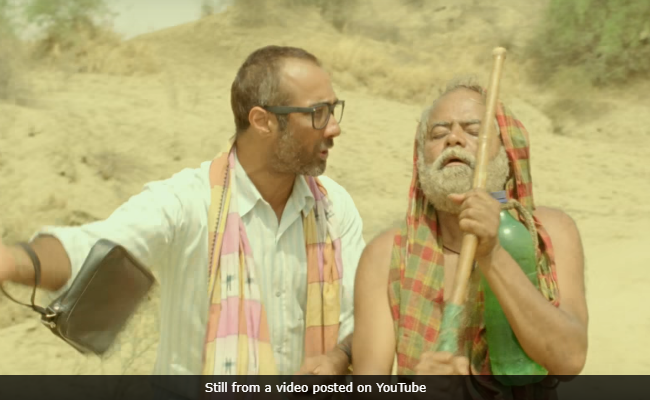
=============
Kadvi Hawa Movie Review: Ranvir Shorey Matches Incredibly Impactful Sanjay Mishra
Kadvi Hawa Movie Review: Sanjay Mishra and Ranvir Shorey's film is delivered without any sugar-coating

Sanjay Misra and Ranvir Shorey in a still from Kadvi Hawa.
Cast: Sanjay Mishra, Ranvir Shorey, Tillotama Shome, Bhupesh Singh, Ekta Sawant
Director: Nila Madhab Panda
Rating: 3.5 Stars (out of 5)
Nila Madhab Panda's Kadvi Hawa is a pill so bitter that no palliative can lessen the sharp aftertaste that it leaves. And that is precisely what this film is meant to do: force the audience to think long and hard about the dangers that lie ahead of mankind if climate change isn't taken seriously and addressed on a war footing at all levels. Delivered without any sugar-coating, Kadvi Hawa blows the lid off our collective indifference to the worsening impact of wobbly weather systems on lives and livelihoods in ecologically vulnerable regions.
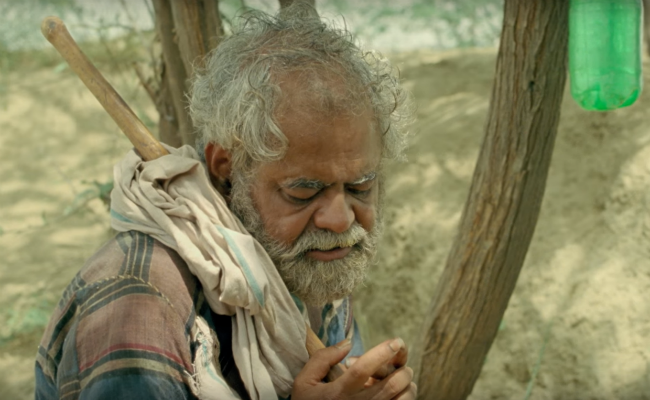 Notwithstanding the slight hint of humour that the screenplay occasionally injects into this story about severely ravaged communities, it is a film that pulls no punches in painting a disturbingly dark picture of the human cost of the cavalier collective disregard of the continuing depletion of finite natural resources.
Notwithstanding the slight hint of humour that the screenplay occasionally injects into this story about severely ravaged communities, it is a film that pulls no punches in painting a disturbingly dark picture of the human cost of the cavalier collective disregard of the continuing depletion of finite natural resources.
In one scene, a teacher asks a school student how many seasons there are. "Summer and winter," the boy answers. What about the monsoon? "It does rain two or three days a year, sometimes in winter, sometimes in summer," he replies, provoking peals of laughter from his classmates. It is the chilling truth and we know all too well that the scarcity of rain is no laughing matter.
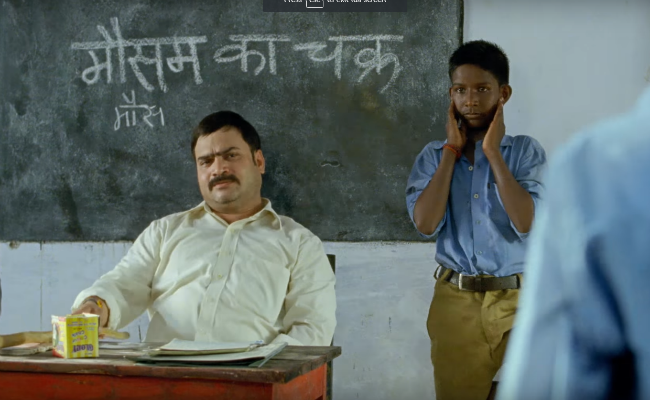
Kadvi Hawa, shot on Super 16mm film that significantly accentuates the forbidding starkness of the landscape, delivers its cautionary tale with an unsettling air of urgency, which is heightened by the sheer power of a brilliant performance from Sanjay Mishra, who fleshes out the character of a sightless old man who, worried for his debt-ridden farmer-son and his family, strikes a deal with a pitiless man who, for the people of this village located off Dholpur, near Agra, is the Devil himself.
But as it turns out, the 'God of Death', who must do his job come what may as a loan recovery agent sent to this rain-deficient region to arm-twist farmers into clearing their outstanding debts, is himself a victim of the fury of nature unleashed by the sea in his native Kendrapara, Odisha. This character is played with energy and precision by Ranvir Shorey, who matches the incredibly impactful Mishra, moment for moment.
The two superlative performances lend Kadvi Hawa its heft. The director does not take recourse to over-dramatic means to convey the depth of despair that drives the two men into each other's orbit in circumstances that are so fast spinning out of control. One thinks that the other could be of help, but neither really knows where their lives are headed. They are both equally at the mercy of the elements and of a system low on humanity.
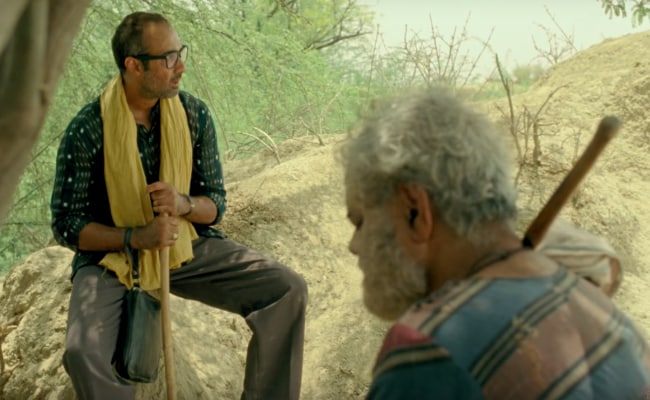 There is, on the face of it, no earthly reason - or, perhaps, there is - for their paths to cross. Hedu, 70 years old, blind and palpably helpless, is instinctive, enterprising and proud of his identity as a farmer despite the grave misfortunes that have befallen him. He lives in an area that hasn't received any rain in ages. He is acutely alive to the need to find a way around his wretched destiny.
There is, on the face of it, no earthly reason - or, perhaps, there is - for their paths to cross. Hedu, 70 years old, blind and palpably helpless, is instinctive, enterprising and proud of his identity as a farmer despite the grave misfortunes that have befallen him. He lives in an area that hasn't received any rain in ages. He is acutely alive to the need to find a way around his wretched destiny.
His brooding son Mukund (Bhupesh Singh) barely utters a word. The old man keeps a tab on him solely through his communication with his daughter-in-law Parvati (Tillotama Shome). His bonding with his elder granddaughter keeps him going, as does the time that he spends with a buffalo named Annapurna (provider of food), his constant companion. Hedu's peregrinations take him every day to the same dusty, barren spot from where he has a vantage view of the route that the adversarial bank collection agent takes to reach the village on his moped.
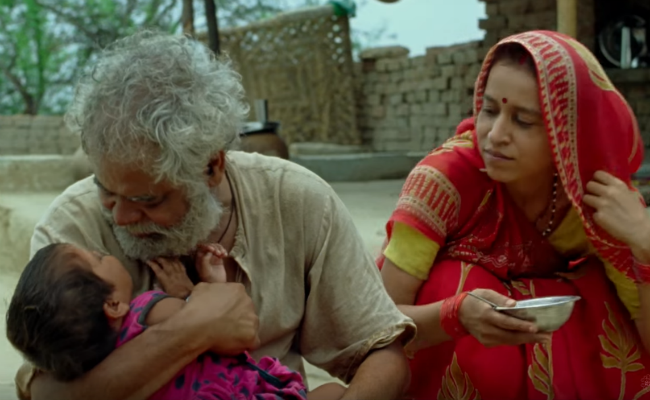 This man, Gunu, an Odia who has opted to relocate to a place miles away from home solely because of the lure of a "double commission" on every recovery on behalf of his bank, is bent upon forcing the 30-odd defaulting farmers of the village Mahua to pay up so that he can one day make enough money to return to his part of the world and move his family - a widowed mother, wife and two daughters - to a safer place.
This man, Gunu, an Odia who has opted to relocate to a place miles away from home solely because of the lure of a "double commission" on every recovery on behalf of his bank, is bent upon forcing the 30-odd defaulting farmers of the village Mahua to pay up so that he can one day make enough money to return to his part of the world and move his family - a widowed mother, wife and two daughters - to a safer place.
Gunu's coastal village, we learn some way into the film, was wiped off the face of the earth by the sea, taking his father along to a watery grave. His distraught mother is left living in hope that her husband will return someday. Gunu's move to the drought-prone Bundelkhand is an act of self-preservation that reeks of extreme duress.
Kadvi Hawa takes several problems in its limited sweep - climate change, extreme weather conditions, the agrarian crisis, farmer suicides and the insensitivity of the banking system - without wavering in its primary focus. It reveals the sheer magnitude of the environmental disasters that stare us in the face through the 'eyes' of a wizened and innately wise man who cannot 'see' but feels and knows the enormity of the challenges ahead as much as through the scalded conscience of a 'heartless' bank employee who pursues his quarries with the dourness of a bloodhound.
On the odd occasion, the film seems to flag a wee bit because the intimate tale of two blighted families has inevitably to be stretched to accommodate the ambitious span of the portrait that the filmmaker wants to present of the havoc that rain can play when there isn't enough of it just as when there is too much of it. Yet, owing to the clarity of the vision that powers the film, Kadvi Hawa hits home with the force of a gale. It is designed to provoke contemplation and action, a mission that it achieves without any serious slips. Watch it because it is an important film that offers an essential takeaway.
Director: Nila Madhab Panda
Rating: 3.5 Stars (out of 5)
Nila Madhab Panda's Kadvi Hawa is a pill so bitter that no palliative can lessen the sharp aftertaste that it leaves. And that is precisely what this film is meant to do: force the audience to think long and hard about the dangers that lie ahead of mankind if climate change isn't taken seriously and addressed on a war footing at all levels. Delivered without any sugar-coating, Kadvi Hawa blows the lid off our collective indifference to the worsening impact of wobbly weather systems on lives and livelihoods in ecologically vulnerable regions.

Kadvi Hawa Movie Review: Sanjay Mishra in a film still.
In one scene, a teacher asks a school student how many seasons there are. "Summer and winter," the boy answers. What about the monsoon? "It does rain two or three days a year, sometimes in winter, sometimes in summer," he replies, provoking peals of laughter from his classmates. It is the chilling truth and we know all too well that the scarcity of rain is no laughing matter.

Kadvi Hawa Movie Review: A still from the film.
Kadvi Hawa, shot on Super 16mm film that significantly accentuates the forbidding starkness of the landscape, delivers its cautionary tale with an unsettling air of urgency, which is heightened by the sheer power of a brilliant performance from Sanjay Mishra, who fleshes out the character of a sightless old man who, worried for his debt-ridden farmer-son and his family, strikes a deal with a pitiless man who, for the people of this village located off Dholpur, near Agra, is the Devil himself.
But as it turns out, the 'God of Death', who must do his job come what may as a loan recovery agent sent to this rain-deficient region to arm-twist farmers into clearing their outstanding debts, is himself a victim of the fury of nature unleashed by the sea in his native Kendrapara, Odisha. This character is played with energy and precision by Ranvir Shorey, who matches the incredibly impactful Mishra, moment for moment.
The two superlative performances lend Kadvi Hawa its heft. The director does not take recourse to over-dramatic means to convey the depth of despair that drives the two men into each other's orbit in circumstances that are so fast spinning out of control. One thinks that the other could be of help, but neither really knows where their lives are headed. They are both equally at the mercy of the elements and of a system low on humanity.

Kadvi Hawa Movie Review: Sanjay Mishra and Ranvir Shorey in a film still.
His brooding son Mukund (Bhupesh Singh) barely utters a word. The old man keeps a tab on him solely through his communication with his daughter-in-law Parvati (Tillotama Shome). His bonding with his elder granddaughter keeps him going, as does the time that he spends with a buffalo named Annapurna (provider of food), his constant companion. Hedu's peregrinations take him every day to the same dusty, barren spot from where he has a vantage view of the route that the adversarial bank collection agent takes to reach the village on his moped.

Kadvi Hawa Movie Review: Sanjay Mishra and Tillotama Shome in a film still.
Gunu's coastal village, we learn some way into the film, was wiped off the face of the earth by the sea, taking his father along to a watery grave. His distraught mother is left living in hope that her husband will return someday. Gunu's move to the drought-prone Bundelkhand is an act of self-preservation that reeks of extreme duress.
Kadvi Hawa takes several problems in its limited sweep - climate change, extreme weather conditions, the agrarian crisis, farmer suicides and the insensitivity of the banking system - without wavering in its primary focus. It reveals the sheer magnitude of the environmental disasters that stare us in the face through the 'eyes' of a wizened and innately wise man who cannot 'see' but feels and knows the enormity of the challenges ahead as much as through the scalded conscience of a 'heartless' bank employee who pursues his quarries with the dourness of a bloodhound.
On the odd occasion, the film seems to flag a wee bit because the intimate tale of two blighted families has inevitably to be stretched to accommodate the ambitious span of the portrait that the filmmaker wants to present of the havoc that rain can play when there isn't enough of it just as when there is too much of it. Yet, owing to the clarity of the vision that powers the film, Kadvi Hawa hits home with the force of a gale. It is designed to provoke contemplation and action, a mission that it achieves without any serious slips. Watch it because it is an important film that offers an essential takeaway.



No comments:
Post a Comment